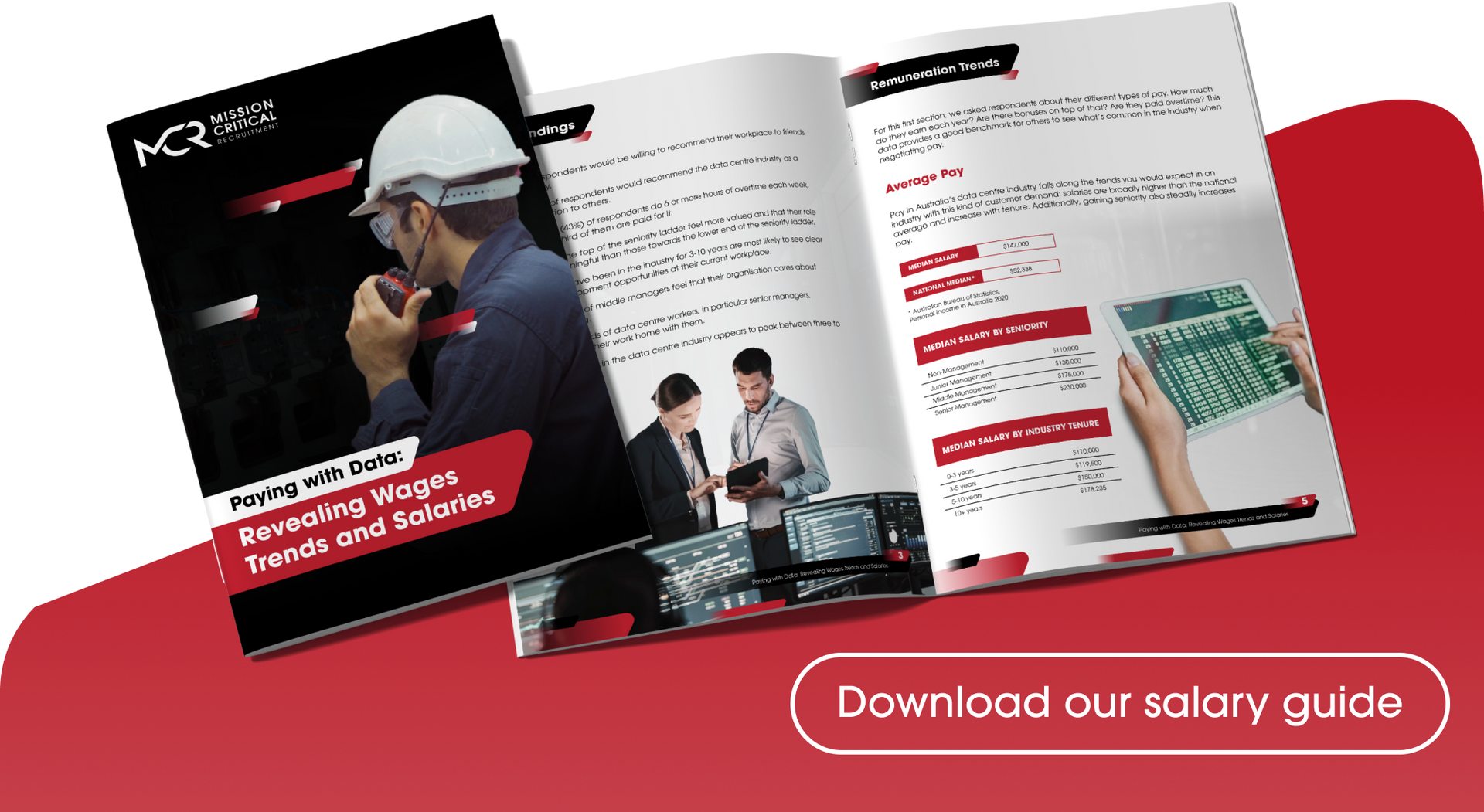Strategies to Improve Your Work/Life Balance

Anyone who works in the data centre industry knows it’s unlike any other when it comes to its fast pace and constant change. With the current skill shortages meaning that many organisations are short-staffed, it’s easy for data centre professionals to feel pressure to work harder, faster and longer. And although the experience you’ll gain quickly can be beneficial for your career, it’s not always the most positive thing for balancing your job with your home life.
Too many hours in the work category can have dire consequences for your mental and physical health. If stress persists for too long, burnout can rear its ugly head. This is a state of mental, physical and emotional exhaustion where even the simplest tasks require an extraordinary effort.
According to the OECD Better Life Index, 13% of Australian employees work excessively long hours, devoting only 14.4 hours each day on average to personal care and leisure (and that’s including sleeping and eating!). The figures are similar in other Asia-Pacific countries such as Japan and New Zealand.
Given these stats, it's no surprise that work/life balance tops the list of priorities in a job for Australian and New Zealand employees, with most Asia-Pacific nations placing it in their top three, according to LinkedIn's Talent Drivers Survey 2021.
With a grasp of the ramifications of a poor work/life balance, let's turn to some strategies you can use to help get your mix exactly right.
Aim for Overall Balance
Getting your balance between work and home right is not about honing a perfect schedule. It's about creating a realistic one that works for your circumstances. It's impossible to ensure every day enjoys the same equilibrium between your personal and professional life.
A better option is to aim for overall balance (say, over a week or fortnight), where you have time to meet your work obligations but also have the energy to enjoy downtime with family, friends and yes, even yourself! How that looks for you will be different to your colleagues.
Consider Your Priorities
Take some time to think about what's important to you in both your personal and professional life and make a note of how much time you spend on each one. Is what you currently do enough – or would you like more?
A clearer picture of your priorities can help you to take proactive steps to schedule in time for all areas of your life. Blocking out time for these activities helps you stick to them, even if it means starting with scheduling family dinners and quality time, gym time or hobby time. The balance on both sides of life will come with time when you practice.
Focus on Your Health
Your health plays into every facet of your life. Without it, it's difficult to be a productive employee let alone a caring partner, parent or friend. While you've heard it all before, exercising, eating and sleeping properly remain key ingredients for a healthy, happy human.
Another way to prioritise your health is to ensure that you are communicating with everyone. If things are overwhelming at work, talk to your boss about finding a better balance throughout your day to take the pressure off. Ensuring that you are communicating at home is also important for your mental and emotional wellbeing.
Practise Good Time Management
Working in the data centre field, you already know the importance of productivity and building good project management skills. When you are structuring your working day, putting these skills to good use is important.
Consider when you’re the most productive and schedule your important tasks at that time. Use apps, calendars and additional software programs to help you automate tasks and keep you on track. Excellent time management will help you to keep your day going the right way so you can finish on time.
Another fantastic tip is to seek out some courses and training sessions to help you with time management. You could ask your employer to see whether they have something in place, but there are usually online courses and external training providers that can help, too.
Set Boundaries
A data centre runs 24/7 but that doesn’t mean you need to be. While there are some employees who will be required to be on call and there are some roles that require night shift work, this should all be communicated to you when you are offered the role. Your employer will be keen to work with you to find the best solution for balance and support you while you work shifts – especially as it’s in their interest to ensure you are a happy employee!
Communication is key here and you must talk to your management team if you are in any way overwhelmed. If you have a recruiter, speak to them if the job you took is more demanding than you expected. They want you to succeed!
Let staff and colleagues know that you've blocked off certain times in your day and/or evening for family and personal time, including your breaks at work. Taking your breaks is vital to your continued health. Neglecting your breaks prevents you from being productive!
Enjoy Your Job
The most successful people share something in common – they love what they do. While every role has its stressors, if you enjoy what you're doing it feels less like work and the stress seems to melt away.
Do you love your job? If the answer is 'no' or 'not sure', consider why. Is it the role? Is it the company culture? Is it your colleagues or management? The good news is that each of these things can be overcome and communication with your management team and your recruiter can help.
Summary
Improving your work/life balance is vital in any workplace, but in fast-paced environments such as data centres, this balance is crucial to your success. If you’re not enjoying your current job or you feel completely neglectful of your personal life, consider contacting one of our data centre recruitment specialists.
When it comes to data centre jobs, we work with a range of both large and niche companies that offer an ever-evolving rotation of interesting opportunities. Please let us know if we can help you make a positive change in any aspect of your data centre career by contacting our team today.















